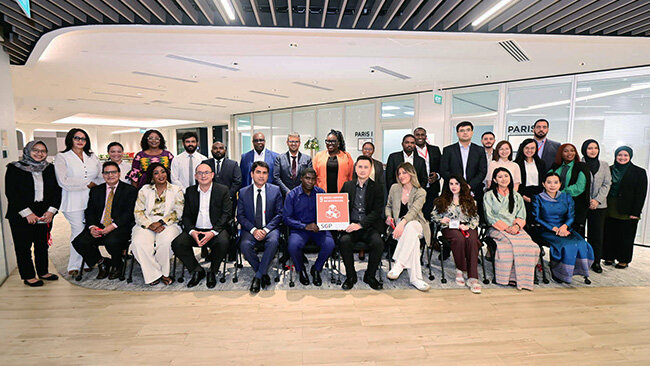
Policy, Purpose & Potential - Navigating the Future of Innovation Together [MFA-SCP: Industry 4.0 and Innovation Management Programme 2025]

(Pictured above) 29 government officials from 24 countries with IPOS International staff at the Industry 4.0 and Innovation Management programme’s opening ceremony
Executive Summary
From 3-7 March 2025, IPOS International, in collaboration with Singapore's Ministry of Foreign Affairs, ran an immersive programme under the Singapore Cooperation Programme Training Award (SCPTA). It brought together a diverse cohort of 29 overseas government officials from 24 countries to explore the transformative potential of emerging technologies and Singapore’s strategy in harnessing innovation for sustainable economic growth in a knowledge-based economy.
Charting the Digital Future Together
In a world where technological disruption is rapidly reshaping global economies, how do government officials prepare their nations for the challenges and opportunities of Industry 4.0? For 29 mid-to-senior officials from 24 countries, the answer came through an immersive week in Singapore—a nation that has successfully transformed itself into a knowledge-based economy at the forefront of technological innovation.
Navigating the Complexities of Digital Transformation
The week-long training initiative provided participants with both theoretical foundations and practical applications of Industry 4.0 technologies through a comprehensive blend of expert-led lectures, practical case studies and immersive site visits. Structured around several thematic pillars, expert speakers and thought leaders covered:
A. Understanding the Industry 4.0 Landscape
Associate Professor Goh Puay Guan [NUS Business School] kicked off the session with an introduction on the key drivers and challenges behind Industry 4.0. The regulatory hurdles—such as data privacy, compliance, and talent development—that must be addressed to ensure successful digital transformation across different sectors were also explored.
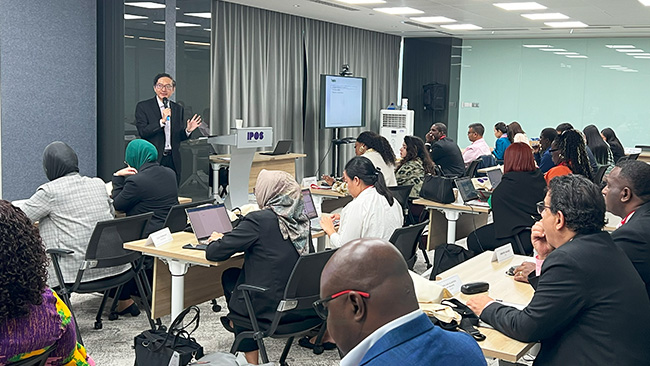
Caption 01: Associate Professor Goh Puay Guan (NUS Business School) delved into the key drivers and challenges of Industry 4.0.
B. Government’s Catalytic Role
In the lecture by Dr Teng Teck Hou [Founder of F.E. Solution], the conversation shifted to how policymakers can nurture technology ecosystems by incentivising research and development, fostering public-private partnerships, and establishing supportive legal frameworks. This exploration emphasised that, far from being passive observers, governments play a pivotal part in guiding industry transformation.
C. Government’s Catalytic Role
Mr Eric Khoo [Head of Global Engagement, IPOS International], zeroed in on the importance of IP protection within an era of rapid technological change. By illustrating how patents, trademarks, and other forms of IP can serve as catalysts for innovation, he underscored their role in securing commercial viability and ensuring fair returns on research investments.
One participant shared, “My knowledge has been further enriched and strengthened as I had the opportunity to have a deeper insight on the latest developments regarding Industry 4.0 especially Big Data, Fintech, SIRI, AI, Blockchain as well as the Intellectual Property aspects related to 4IR.”
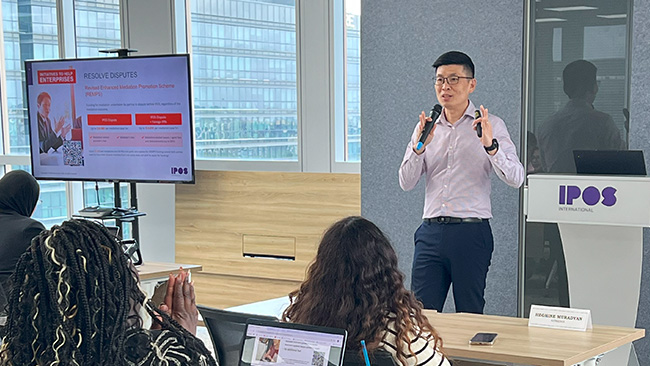
Caption 02: Mr Eric Khoo (IPOS International) deep dived into intellectual property management principles in the context of rapidly evolving technologies.
Seeing is Believing: Innovation in Action
Complementing the expert-led lectures was a series of curated site visits that showcased industry 4.0 principles in action:
- Hyundai Motor Group Innovation Center Singapore (HMGICS):
Participants witnessed cutting-edge manufacturing systems where automation, AI, and modular production techniques are transforming automotive manufacturing.
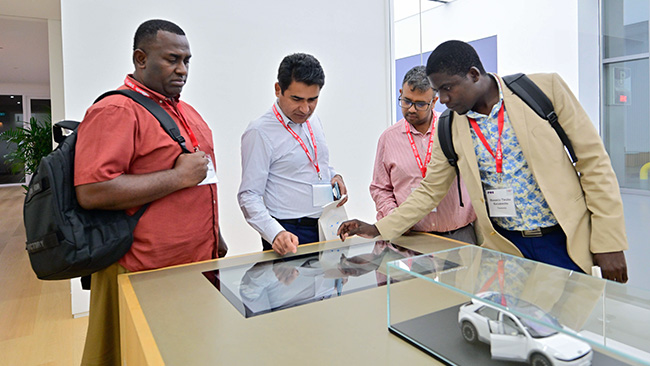
Caption 03: Participants explored highly modular and automated production systems at the Hyundai Motor Group Innovation Center Singapore (HMGICS) with valuable insights into how these technologies are designed to accommodate diverse needs. Photo credit: Ministry of Foreign Affairs, Singapore
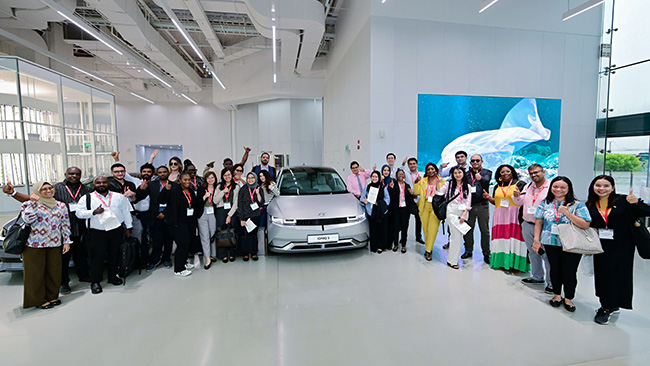
Caption 04: The group concluded their HMGICS discovery tour with an iconic photo featuring the Ioniq 5. Photo credit: Ministry of Foreign Affairs, Singapore
- Mastercard Experience Centre:
Participants explored how financial technology innovations are reshaping payment systems and financial inclusion on a global scale.
- The Advanced Manufacturing Centre at Singapore Polytechnic:
The visit demonstrated how educational institutions are adapting to train the workforce of tomorrow, bridging the gap between traditional manufacturing skills and digital competencies.
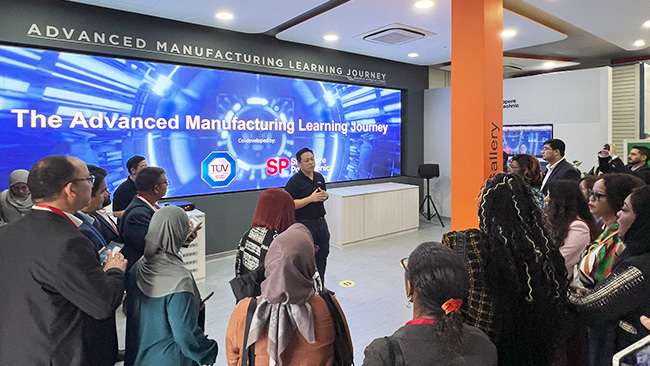
Caption 05: Dr Lee Kim Kheng (Centre Director, Advanced Manufacturing Centre at Singapore Polytechnic) shared insights on equipping the next-gen workforce with digital skills with the participants.
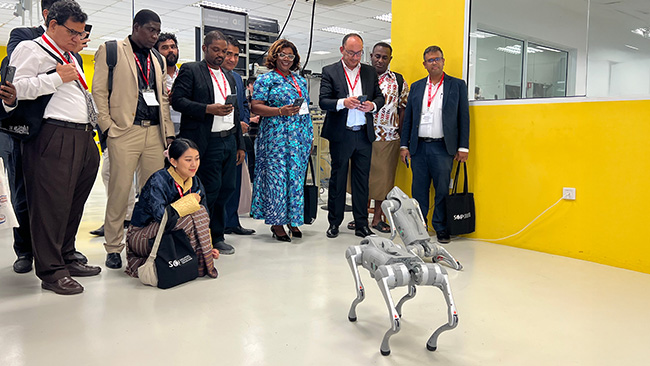
Caption 06: Programme participants captivated by the remote-controlled devices that were programmed to perform various tasks.
Sharing Cross-Cultural Perspectives, Building Networks
Beyond the structured curriculum, the programme created valuable opportunities for cross-cultural exchange. Officials from Bhutan, Costa Rica, Ghana, Maldives, Mauritius, Philippines, and other nations shared their unique challenges and perspectives, creating a rich tapestry of insights and dialogue.
“I was totally mesmerised by the leapfrogged technological advancement that Singapore has made during the past few years in respect of the fast adoption of digitalisation and Industry 4.0 technologies. The lectures, site visits and network engagements have truly inspired me to further develop the industrial development agenda for my country by way of implementing the right policy mix.”, remarked one participant.
Another participant highlighted: “This programme has equipped us with a deeper understanding of the future of manufacturing and the pivotal role governments play in transforming industrial landscapes. We’ve gained valuable insights into strategies for adapting to technological advancements, the importance of intellectual property principles, and the application of artificial intelligence in smart industries — all of which are crucial for the sustainable development of our economies”.
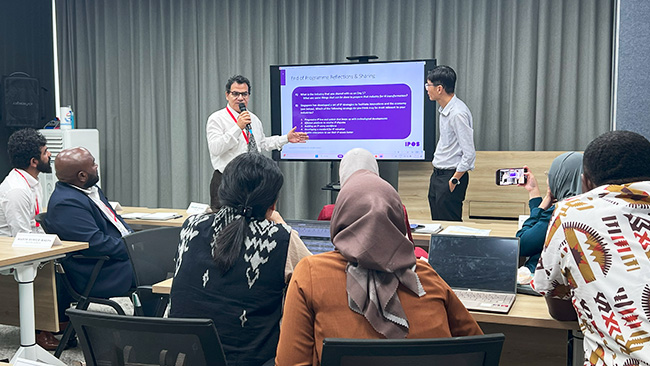
Caption 07: Dr Samir Zane Elabdeen Aly Ibrahim from Egypt, shared his closing reflections on behalf of his cohorts.
Actionable Insights and Strategies for National Innovation
By the programme’s conclusion, participants were equipped with a clearer roadmap to harness Industry 4.0 for sustainable development. Major takeaways included:
- Regulatory & Legal Frameworks:
Understanding how robust legislation and forward-thinking policies can nurture a thriving environment for advanced manufacturing and digital innovation.
- Strategic Technology Adoption:
Recognising how AI, big data, blockchain, and fintech can collectively drive national competitiveness in a knowledge-based economy.
- Role of IP for Innovation:
Appreciating intellectual property’s critical role in protecting, monetising, and scaling technological breakthroughs.
For many participants, the programme sparked ideas for implementing "the right policy mix" to advance industrial development agendas in their respective countries.
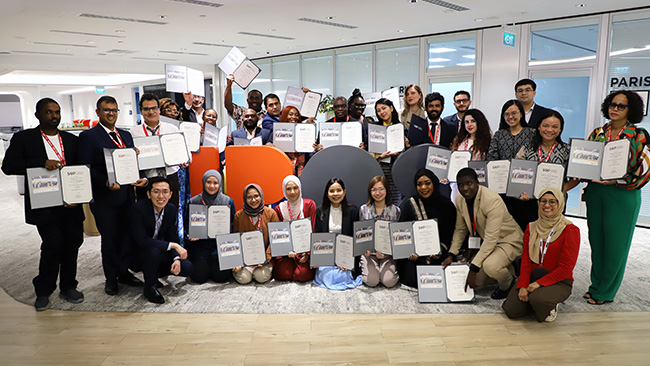
Caption 08: Gratitude and celebratory moments at the certificate presentation ceremony as participants marked the successful completion of the week-long programme.
Building Global Capacity Through Knowledge Transfer
The Industry 4.0 and Innovation Management programme—now in its fourth successful iteration—stands as a testament to the fruitful collaboration between Singapore's Ministry of Foreign Affairs and IPOS International. This partnership embodies Singapore's deeply held conviction that nations rise together when knowledge and best practices are generously shared across borders.
As Industry 4.0 technologies continue to evolve at an unprecedented pace, the importance of international dialogue and collaborative learning cannot be overstated. The future belongs to those who can adapt quickly, innovate thoughtfully, and implement strategically. By bringing together diverse perspectives and expertise, programmes like this create powerful ripple effects—enabling governments to craft forward-thinking policies that foster inclusive growth and sustainable development across sectors and regions.
Join Us in Shaping the Future of IP and Innovation Transformation
The journey doesn't end here. IPOS International welcomes organisations and institutions interested in similar transformative learning experiences to reach out to our Academy team at enquiry.academy@iposinternational.com. Together, we can continue building bridges that connect today's challenges with tomorrow's solutions.
About Singapore Cooperation Programme (SCP)
The Singapore Cooperation Programme (SCP) was established in 1992 to pay forward the technical assistance that Singapore received from the international community in our early years of independence. The SCP courses cover a wide range of topics that support national development and social resilience, enabling countries to build capabilities and tackle challenges in a fast evolving global environment.
Working with more than 50 local and international partners, we have shared our development experience with over 155,000 government officials from more than 180 countries, territories and intergovernmental organisations.
The SCP is managed by the Technical Cooperation Directorate of the Ministry of Foreign Affairs, Singapore. For a comprehensive list of SCP’s social media channels and resources visit linktr.ee/scpgovsg